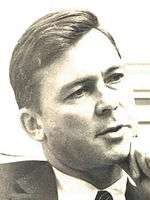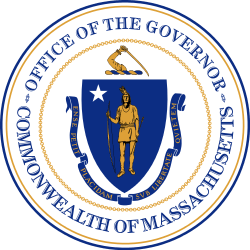Endicott Peabody
| Endicott Peabody | |
|---|---|
 | |
| 62nd Governor of Massachusetts | |
|
In office January 3, 1963 – January 7, 1965 | |
| Lieutenant | Francis X. Bellotti |
| Preceded by | John A. Volpe |
| Succeeded by | John A. Volpe |
| Member of the Massachusetts Governor's Council for the 3rd District | |
|
In office 1955–1957 | |
| Preceded by | Otis Whitney |
| Succeeded by | Christian A. Herter, Jr. |
| Personal details | |
| Born |
February 15, 1920 Lawrence, Massachusetts |
| Died |
December 1, 1997 (aged 77) Hollis, New Hampshire |
| Political party | Democratic |
| Spouse(s) |
Barbara Welch Gibbons (1944-1997, his death) |
| Profession | Lawyer |
| Religion | Episcopalian |
| Awards |
Silver Star Presidential Unit Citation |
| Military service | |
| Service/branch |
|
| Battles/wars | |
Endicott Peabody (February 15, 1920 – December 1, 1997) was the 62nd Governor of Massachusetts, serving a single two-year term from January 3, 1963 to January 7, 1965.
Early life
Endicott Peabody, nicknamed "Chub", was born in Lawrence, Massachusetts, to Mary Elizabeth (née Parkman) and the Rev. Malcolm E. Peabody, former Episcopal Bishop of Central New York. He was a grandson of the founder of the Groton School and Brooks School, also named Endicott Peabody. He earned his B.A. from Harvard College in 1942. An All-America star defensive lineman for the Harvard Crimson football team, he was later inducted into the College Football Hall of Fame.
Peabody served in the United States Navy during World War II. He received the Silver Star for gallantry for service as a Lieutenant aboard the USS Tirante in the Pacific Ocean theater.[1][2]
After the war Peabody attended Harvard Law School, receiving his J.D. degree and attaining admission to the Massachusetts bar in 1948. He was Assistant Regional Counsel for the Office of Price Stabilization and Regional Counsel for the Small Defense Plants Administration in the early 1950s. From 1954 to 1956 he served on the Massachusetts Governor's Council. During the 1960 presidential election he coordinated John F. Kennedy's campaigns in West Virginia, Pennsylvania, and New Hampshire.[3]
Tenure as Governor
In the Massachusetts gubernatorial election, 1962, Peabody was elected Governor, upsetting Republican incumbent John Volpe by only 4,431 votes out of over two million cast.
During his administration, voters approved a state constitutional amendment extending the terms of office of all state constitutional officers from two years to four years, starting from election. Peabody advocated laws to prevent discrimination in housing and to establish drug addiction treatment programs. He also strongly opposed capital punishment and "vowed that he would not sign a death warrant even for the Boston Strangler, if he were ever caught and convicted."[4]
On April 1, 1964, a front-page news story occurred when the governor's 72-year-old mother, Mary Parkman Peabody, was arrested at the Ponce de Leon Motor Lodge in St. Augustine, Florida, for attempting to be served in an integrated group at a racially segregated restaurant, which made her a hero to the civil rights movement and brought the efforts in St. Augustine, the nation's oldest city, to national and international attention. The story of her arrest is told in many books, including one by her arrest companion, Hester Campbell, entitled Four for Freedom.
Peabody is remembered for recommending the commutation of every death sentence that he reviewed while he served as governor between 1963 and 1965,[5] in connection with his efforts to get the legislature to abolish the death penalty.[6]
In September 1964 Lieutenant Governor Francis X. Bellotti defeated Peabody in the Democratic primary; Bellotti then lost the general election to Volpe.[3]
Senate campaign
In 1966, Peabody successfully sought the Democratic nomination for a U.S. Senate seat, which was open that year; he was defeated by a landslide in the general election by liberal Republican state Attorney General Edward Brooke.
1972 vice presidential election
Peabody undertook a quixotic campaign for Vice President of the United States on the Democratic ticket in 1972;[7] he came in fourth in the balloting at the 1972 Democratic National Convention. He ran under the slogan "Endicott Peabody, the number one man for the number two job."
New Hampshire
In 1983, he moved to Hollis, New Hampshire, where he ran unsuccessfully for local and statewide political office several times, including a 1986 senatorial campaign against Republican Warren Rudman. He died from leukemia in 1997 in Hollis, aged 77. His remains were interred in Groton, Massachusetts.
Family
Peabody was a descendant of the colonial Massachusetts governor John Endecott.
On June 24, 1944 he married Barbara Welch "Toni" Gibbons (1922–2012), a native of Bermuda, the elder daughter of Morris Gibbons, a member of the Parliament of Bermuda, and his wife, the former Maude Madge Welch. Peabody and his wife had a daughter, Barbara, and two sons, Robert and Endicott Jr.[8]
Peabody's sister, Marietta Peabody Tree, represented the United States on the United Nations Commission on Human Rights.[9]
Navy Awards
- Silver Star
- Presidential Unit Citation
- American Campaign Medal
- Asiatic-Pacific Campaign Medal with two battle stars
- World War II Victory Medal
|
Endicott Peabody electoral history |
|---|
|
1958 Democratic primary for Massachusetts Attorney General[10]
1960 Democratic primary for Governor of Massachusetts[11]
1962 Democratic primary for Governor of Massachusetts[12]
Massachusetts gubernatorial election, 1962[13]
1964 Democratic primary for Governor of Massachusetts[14]
Democratic primary for Massachusetts United States Senate election, 1966[15]
Massachusetts United States Senate election, 1966[16]
1972 Democratic National Convention (Vice Presidential tally)
Democratic primary for U.S. Senate from New Hampshire, 1986[17]
New Hampshire United States Senate election, 1986[18]
New Hampshire Democratic Vice Presidential primary:[19]
New Hampshire House of Representatives Hillsborough District #22 election, 1992[20]
(* - write-in candidate) |
References
- ↑
- ↑
- 1 2 Endicott Peabody profile (1920-1997)
- ↑ Gottschalk, Marie (2011-03-16) Is Death Different?, The New Republic
- ↑ Peabody's commutation of capital punishment sentences
- ↑ The last execution in Massachusetts state history occurred in 1947.
- ↑ Molotsky, Irvin (December 4, 1997). "Endicott Peabody, 77, Dies; Governor of Massachusetts in 1960s". The New York Times.
- ↑ Marquard, Bryan (June 10, 2012). "Toni Peabody, 89; outspoken wife of governor's governor wife aided disabled; at 89". The Boston Globe.
- ↑ Palumbo, Mary Jo (August 17, 1991). "Marietta Tree, at 74, longtime public servant". Boston Herald. Retrieved 2 December 2011.
- ↑ Our Campaigns - MA Attorney General- D Primary
- ↑ Our Campaigns - MA Governor - D Primary Race - Sep 13, 1960
- ↑ Our Campaigns - MA Governor - D Primary
- ↑ Our Campaigns - MA Governor Race - Nov 06, 1962
- ↑ Our Campaigns - MA Governor - D Primary
- ↑ Our Campaigns - MA US Senate - D Primary
- ↑ Our Campaigns - MA US Senate Race - Nov 08, 1966
- ↑ Our Campaigns - NH US Senate- D Primary Race - Sep 09, 1986
- ↑ Our Campaigns - NH US Senate Race - Nov 04, 1986
- ↑ Our Campaigns - US Vice President - D Primary Race - Feb 18, 1992
- ↑ NH State House - Hillsborough 22
External links
- "Obituary — Endicott Peabody, 77, Dies; Governor of Massachusetts in 60's". The New York Times. December 4, 1997.
| Political offices | ||
|---|---|---|
| Preceded by John A. Volpe |
Governor of Massachusetts January 3, 1963 – January 7, 1965 |
Succeeded by John A. Volpe |
